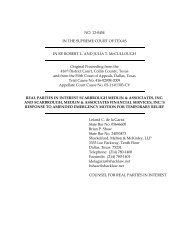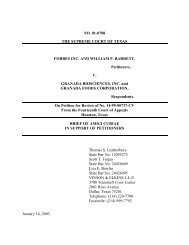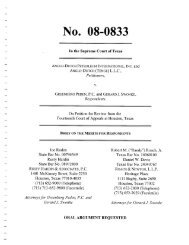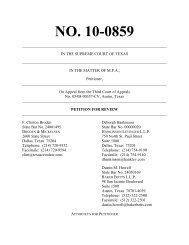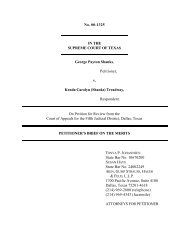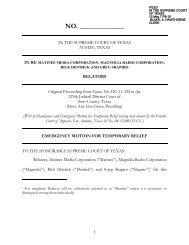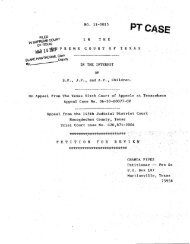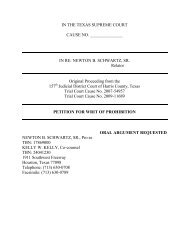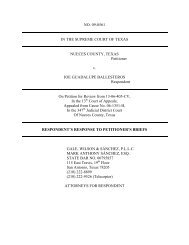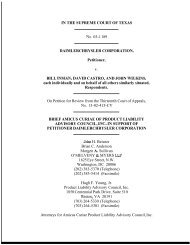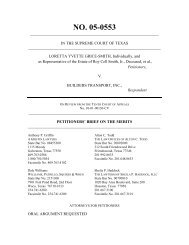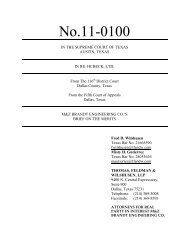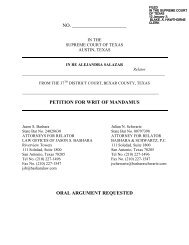Petition for Writ of Mandamus - Filed - Supreme Court of Texas
Petition for Writ of Mandamus - Filed - Supreme Court of Texas
Petition for Writ of Mandamus - Filed - Supreme Court of Texas
You also want an ePaper? Increase the reach of your titles
YUMPU automatically turns print PDFs into web optimized ePapers that Google loves.
<strong>Texas</strong> Comptroller <strong>of</strong> Public Accounts<br />
May 11,2012<br />
Page 2<br />
The <strong>Texas</strong> franchise tax is a tax on the value <strong>of</strong> the privilege <strong>of</strong> doing business in <strong>Texas</strong><br />
(the "Privilege") and is intended to exact a tax commensurate with the value <strong>of</strong> the Privilege.<br />
Bullock v. Nat'l Bancshares Corp., 584 S.W.2d 268, 270 (Tex. 1979); Gen. Dynamics Corp. v.<br />
Bullock, 547 S.W.2d 255, 257 (Tex. 1976). The franchise tax is imposed on entities that are<br />
created by state law and that enjoy the Privilege, such as corporations and limited partnerships,<br />
and is not imposed on entities that are not creatures <strong>of</strong> state law and that do not enjoy the<br />
Privilege, such as sole proprietorships and general partnerships. See TEX. TAX CODE ANN. §§<br />
171.0002 and 171.001(a). The State <strong>of</strong> <strong>Texas</strong> will revoke the Privilege from a state law entity<br />
that does not pay the franchise tax. Id. §§ 171.251-.2515 and 171.301-.3015.<br />
Because the franchise tax is imposed in exchange <strong>for</strong> the Privilege and is intended to be<br />
commensurate with the value <strong>of</strong> the Privilege, the Equal and Uni<strong>for</strong>m Clause requires any tax<br />
classifications within the franchise tax to be reasonably related to that value, and not merely to<br />
any conceivable state purpose. In order <strong>for</strong> the tax to be commensurate with the value <strong>of</strong> the<br />
Privilege, the value must generally be ascertained by the same standard <strong>for</strong> all taxpayers. See<br />
Bullock v. Sage Energy Co., 728 S.W.2d 465, 468 (Tex. App.—Austin 1987, writ ref'd n.r.e.)<br />
(citing Lively v. Mo., K & T Ry. Co. <strong>of</strong> <strong>Texas</strong>, 120 S.W. 852, 856 (Tex. 1909)). Any<br />
classifications among taxpayers must reasonably relate to the value <strong>of</strong> the Privilege.<br />
B. Classifications within the Margin Tax calculation do not reasonably relate<br />
to the value <strong>of</strong> the Privilege.<br />
The calculations <strong>of</strong> total revenue, cost <strong>of</strong> goods sold ("COGS"), and compensation, the<br />
application <strong>of</strong> the COGS and compensation deductions, and the determination <strong>of</strong> the tax rate,<br />
contain classifications that bear no relationship to the value <strong>of</strong> the Privilege exercised and,<br />
accordingly, are unreasonable, arbitrary, and capricious. The Margin Tax calculation begins<br />
with a baseline concocted by the Legislature called "Total Revenue." TEX. TAX CODE ANN. §<br />
171.101(a), The calculation <strong>of</strong> Total Revenue begins with the gross income <strong>of</strong> all taxpayers<br />
(this is equal and uni<strong>for</strong>m), but then allows only certain income and expense deductions to<br />
some taxpayers engaged in certain lines <strong>of</strong> business (this is neither equal nor uni<strong>for</strong>m). Id. §<br />
171.1011. Section 171,1011 allows deductions <strong>for</strong> various income or expense items <strong>of</strong> lending<br />
institutions, legal services providers, pharmacy cooperatives, destination management<br />
companies, staff leasing companies, management companies, health care providers, health<br />
care institutions, and operators <strong>of</strong> facilities <strong>for</strong> the federal government that are not available to<br />
all other taxpayers. Id. § 171.1011 (g-1)-(q).<br />
These deductions plainly, randomly, and unreasonably allow certain income and<br />
expense deductions from Total Revenue only to certain taxpayers. While the resulting value <strong>for</strong><br />
Total Revenue includes all gross income <strong>of</strong> some taxpayers, it includes only a portion <strong>of</strong> gross<br />
income <strong>for</strong> other taxpayers. Consequently, the calculation <strong>of</strong> Total Revenue does not actually<br />
determine the amount <strong>of</strong> gross income that all taxpayers derive from exercising the Privilege<br />
but, instead, departs from such a calculation in an unreasonable, arbitrary, and capricious<br />
manner unrelated to the value <strong>of</strong> the Privilege.<br />
The calculation <strong>of</strong> COGS under Section 171.1012 similarly allows certain deductions<br />
only to certain taxpayers. A COGS deduction generally is allowed only to taxpayers that sell<br />
goods, but lending institutions are uniquely allowed to deduct interest expense as COGS and<br />
lessors <strong>of</strong> motor vehicles, heavy construction equipment, and railcar rolling stock are expressly<br />
allowed to deduct costs associated with the leased property as COGS. Id. § 171.1012(k), (k-1).<br />
AUSTENl \661403 vl 52275-1



